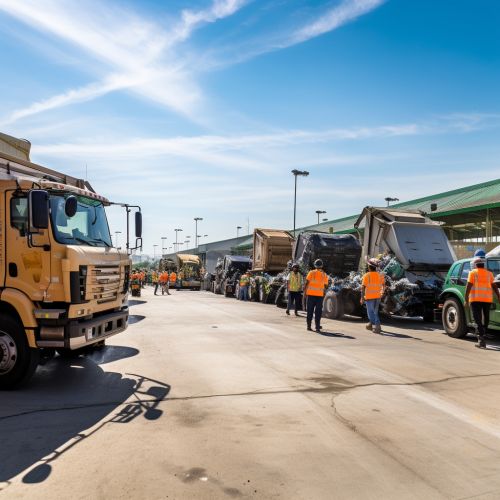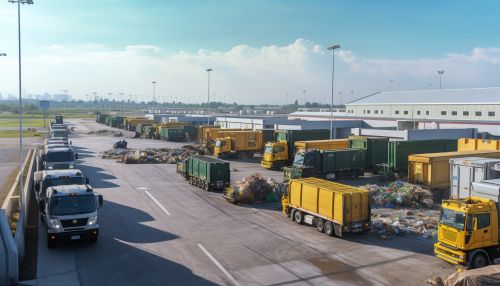Waste management
Introduction
Waste management, also known as waste disposal, encompasses the activities and actions required to manage waste from its inception to its final disposal. This includes the collection, transport, treatment, and disposal of waste, together with monitoring and regulation of the waste management process and waste-related laws, technologies, economic mechanisms.


Types of Waste
Waste can be categorized into several types, each of which may require a different method of management. The main types of waste include MSW, Hazardous Waste, Biodegradable Waste, and Recyclable Material.
Municipal Solid Waste
Municipal Solid Waste (MSW), commonly known as trash or garbage, consists of everyday items discarded by the public. This can include food scraps, yard waste, and product packaging.
Hazardous Waste
Hazardous waste is waste that poses substantial or potential threats to public health or the environment. It can be in the form of solids, liquids, or contained gases, and it often is the byproduct of industrial processes.
Biodegradable Waste
Biodegradable waste includes any organic material in waste which can be broken down into carbon dioxide, water, methane, or simple organic molecules by micro-organisms and other living things using composting, aerobic digestion, anaerobic digestion, or similar processes.
Recyclable Material
Recyclable materials include many kinds of glass, paper, cardboard, metal, plastic, textiles, and electronics. The composting or other reuse of biodegradable waste—such as food or garden waste—is also a form of recycling.
Waste Management Methods
There are several methods of waste management, and the choice of method often depends on the type of waste and the economic and social policies of the region. These methods include landfilling, incineration, recycling, biological treatment, and waste reduction.
Landfill
Landfilling is the most common method of waste disposal and involves the burial of waste in a designated area. Modern landfills are well-engineered facilities designed to minimize the impact of solid waste on the environment and human health.
Incineration
Incineration is a waste treatment process that involves the combustion of organic substances contained in waste materials. This process reduces the volume of waste by up to 90% and is used to dispose of solid, liquid, and gaseous waste.
Recycling
Recycling involves converting waste materials into reusable materials and objects. It is an alternative to "conventional" waste disposal that can save material and help lower greenhouse gas emissions.
Biological Treatment
Biological treatment processes use microorganisms to decompose organic waste materials. These processes include composting, anaerobic digestion, and mechanical biological treatment.
Waste Reduction
Waste reduction, also known as waste prevention, aims to reduce the generation of waste through education, policy, and practice. This can include reusing items, reducing packaging, and choosing products that are durable and long-lasting.
Environmental Impact of Waste Management
The environmental impact of waste management is significant and includes greenhouse gas emissions, air pollution, water pollution, and soil contamination. Proper waste management practices can mitigate these impacts and contribute to sustainable development.
Future of Waste Management
The future of waste management lies in the development of new technologies and practices that can reduce the environmental impact of waste and increase the efficiency of waste management processes. This includes the development of waste-to-energy technologies, zero waste strategies, and circular economy models.
